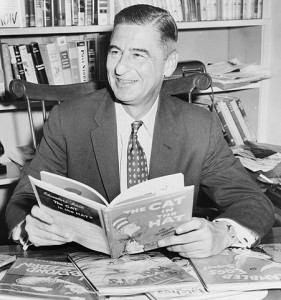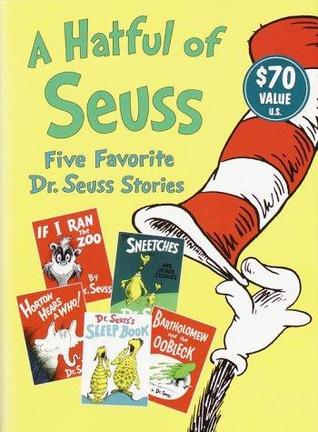by Naomi L. | November 20, 2013 | Blog, Creative Writing, Notable Authors |
I’ve been feeling a little nostalgic lately: looking through my books for old favorites, watching movies from my childhood whenever they’re on TV, even listening to songs from the ’90s once in a while. That’s how I recently had an idea for another post on inspiration, because when I think about my childhood, one of the most prominent figures that comes to mind is the author of some of my favorite classics of children’s literature: Dr. Seuss.

Theodor Geisel in 1957
Bio
Name: Theodor Seuss Geisel
Pen Name: Dr. Seuss
Life: Mar. 2, 1904 – Sept. 24, 1991
Gender: male
Nationality: American
Occupation: writer, cartoonist, animator, publisher, artist
Genres: children’s literature
Notable Works: The Cat in the Hat, Horton Hears a Who!, Green Eggs and Ham
My Favorite Works: The Cat in the Hat, The Sneetches and Other Stories, Horton Hears a Who!, How the Grinch Stole Christmas!
Inspiration
Dr. Seuss was a huge part of my childhood. When I was little, my mother signed us up for the Dr. Seuss book club, so we would get one of his books in the mail every month. By the time I started reading on my own, I had a large collection of fun stories to choose from, such as The Cat in the Hat, Horton Hears a Who! and Green Eggs and Ham. Because of this, my earliest memories of reading were filled with colorful characters and silly rhymes that kept me entertained for hours on end. If I ever wanted to get lost in books, I could always count on Seuss’s imaginative world.
The main reason I find this author so inspiring is because his stories were an important first step into my love of books. Sometimes I wonder if I would have grown to love reading as much as I do today if I hadn’t had the privilege of enjoying Dr. Seuss’s work at such a young age. His books were very easy to read and understand, and that always made reading such a pleasure. In fact, his rhymes and style of writing were so memorable that to this day, my mom and I can quote lines word for word back to each other. In this way, Seuss gave us the gift of memories that we could share for the rest of our lives.

A Hatful of Seuss: Five Favorite Dr. Seuss Stories
But there was much more to these books than simple rhymes and oddly shaped characters with bizarre names. Dr. Seuss had a talent for embedding important lessons in his stories without making them blatantly obvious or patronizing. Moral issues are cleverly hidden behind tales of strange creatures living in unusual worlds: The Sneetches shows us that racism is unjustified; The Lorax shines light on environmentalism and the dangers of corporate greed to the natural world; How the Grinch Stole Christmas! criticizes the commercialization that the holiday season has suffered over time; and even a story as simple as Green Eggs and Ham can be read as a lesson on trying new things in order to form educated opinions. There was almost always something to learn in Seuss’s books, and because the lessons were presented in such a kid-friendly format (complete with his colorful illustrations), it made his stories that much more accessible to children just starting to discover the world around them.
There are quite a few authors I associate with my childhood, but Dr. Seuss is by far one of my favorites. His books inspired me to continue reading beyond the beginner level, and the lessons in his stories have stayed with me into my adult years. Even now, I can’t help but smile as I think about how I once knew The Sneetches by heart and how I still enjoy reading Horton Hears a Who! out loud once in a while. Though authors like Roald Dahl and J.K. Rowling were great inspirations for my writing, Dr. Seuss was a great inspiration for my reading, and in my opinion, there’s no greater gift that a writer can give to children. To the little girl still in my heart, Dr. Seuss will always be a hero.
by Naomi L. | November 18, 2013 | Blog, Word of the Week |
Word: pulchritude
Pronunciation: PƏL-krə-t(y)ood
Part of Speech: noun
Definition: (poetic/literary) beauty
Source: Oxford Dictionaries
I stumbled upon this word while looking through some old vocabulary flashcards, and I distinctly remember the first thought that came to mind when I read it: What an ugly word. It didn’t just look ugly; it sounded ugly. In fact, as soon as I saw it, I assumed it meant something along the lines of “disgust” or “repulsion”. To my surprise, the other side of the card proved me very wrong: “beauty”. “Beauty”? Seriously? How could such an ugly word have such a lovely definition? It was strange, to say the least. But then again, who am I to judge the quirks of language?
“Pulchritude” is a poetic and literary term meaning “beauty”. The word comes from the Latin noun pulchritudo, which also means “beauty”. This, in turn, stems from the adjective pulcher, meaning “beautiful” or “handsome”. “Pulchritude” dates back to Middle English, possibly explaining its poetic uses.
The word “pulchritude” is certainly interesting, I’ll give it that. Having said that, I highly doubt you’ll ever see me use it in my writing. I just can’t get past that harsh tone; there are definitely much softer words I’d prefer to use as synonyms for “beauty”. That’s not to say you shouldn’t use it, of course. If you like unusual poetic words, then by all means, write about the “pulchritude” of a woman in her prime or a cherry tree in spring. If you can appreciate the literary history behind this word, I’m sure you’ll be able to use it well. Have fun!
What are your thoughts on this word? Any suggestions for future “Word of the Week” featured words?
by Naomi L. | November 15, 2013 | J.C. Wolfe's Writing, Poetry |
An intelligent person knows how to carry on a conversation with other intelligent people.
A smart person knows how to carry on a conversation with anyone.
An intelligent person knows when it’s OK to be completely honest.
A smart person knows when to be honest, and when it is absolutely necessary to lie.
An intelligent person can tell the exact moment when everything went wrong.
A smart person can tell the exact moment when everything will go wrong, and figure out how to prevent it from ever happening.
An intelligent person doesn’t need to be asked twice to do a favor.
A smart person doesn’t need to be asked once.
An intelligent person knows how to make a valid point to any idiot.
A smart person knows that to try to make a valid point to an idiot is a waste of time.
I am an intelligent person.
But often I wish I were smart.
by Naomi L. | November 13, 2013 | Blog, Creative Writing |
Yes, it’s time for another round of Writers Reveal! Today’s topic comes from the newest member of our circle, Emily Toxward, who sent me the prompt “circling helicopters”. Here’s the short story I wrote based on that idea. Hope you like it! Thanks for the topic, Emily!
Rescue Me
Circle overhead… searching for a lost soul…
My heart is pounding in my ears. The pain is sharp and constant. The air around me is cool on the breeze.
I wait. I’ve been waiting for hours. I may be here for a few more. Is anyone looking for me?
I know I shouldn’t have gone off the trail. But I wanted to be adventurous. I wanted to explore. Just once, I wanted to prove them wrong, show them that I’m not always so afraid, that I can live on the edge too.
And look where it’s gotten me. Maybe they were right all along.
I still think I could have made it if those darn rocks hadn’t slipped. Now I’m lost and trapped, with nothing but the wind and my own breathing to break the silence.
And the occasional whirring noise in the distance, like the one approaching now.
This is the third helicopter to pass in two hours. Or maybe it’s the same one on its third lap around the mountain. It’s hard to tell when it blends into the clouds of the evening sky.
“I’m here!” Yet again, I try to get its attention, waving my arms while trying not to move my injured leg. “Look at me! Please…”
I wince as my foot brushes against the fallen rocks. Yes, it’s definitely broken; my leg doesn’t normally bend that way.
“Help me…” The cold is so overbearing, I can hardly get the words out anymore. Not that they’d hear me anyway. But with a broken limb, my options are limited.
I watch the helicopter pass overhead. Curse these trees! Why couldn’t I have fallen on open ground? I’d have been rescued ages ago!
Wait, what’s that? In the face of a darkening sky and a rising moon, a searchlight now appears under the helicopter. By some miracle, the light finds its way to my patch of earth. Yes! Surely they can see me now!
But will they reach me in time?
The sound of howling suddenly pierces the evening air. Not now, please not now. They’re so close! I can already hear the whirring getting louder again…
The sunlight is fading fast. I’m too exhausted to move anymore. The howling grows louder, but I swear I can see the aircraft turning around. It must be coming back for me… It must…
The world around me grows dark. All I can see anymore is that beacon of hope in the sky. I close my eyes and wait for the rotating blades of salvation to reach me before the mountain beasts do…
Helicopters circle overhead, all day searching for a lost soul to rescue. It doesn’t matter if this one’s for me; the next one will find me for sure.
This has been a special topic post in Emily Morgan’s Writers Reveal. To learn more, just follow the button below to her site, and be sure to check out the other blogs participating in the event. Thanks for reading!

Other bloggers in the Writers Reveal
Emily Morgan: Emily Morgan Writes
Melissa Khalinsky: Melissa Writes
Jodi Gibson: JFGibson
Becky Fyfe: Imagine! Create! Write!
Josefa: Always Josefa
Rhianna: A Parenting Life
Ashley Howland: Ghostnapped
Emily Hawker: You Learn Something New Every Day
Emily Toxward: Have A Laugh On Me
by Naomi L. | November 11, 2013 | Blog, Word of the Week |
Word: fastidious
Pronunciation: fas-TI-dee-əs
Part of Speech: adjective
Definition:
- very attentive to and concerned about accuracy and detail
- very concerned about matters of cleanliness
Source: Oxford Dictionaries
Ana Pascal: My tax files. (pulls out a box full of loose papers)
Harold Crick: You keep your files like this?
Ana: No, actually I’m quite fastidious. I put them in this box just to screw with you.
– Stranger Than Fiction (2006)
The above dialogue from the film Stranger Than Fiction is a great example of how the meaning of an uncommon word can be made perfectly clear in context. While being audited by IRS agent Harold Crick, Ana Pascal claims that contrary to his first impression, she’s actually very neat and organized. She makes it clear that the only reason she presents her tax files in such disarray is to spite the “taxman” who’s come to disrupt her life, a plan that pretty much works exactly the way she hoped.
A “fastidious” person is someone who is particularly attentive to detail, especially in matters of cleanliness. Interestingly, this adjective comes from the Latin noun fastidium, which means “loathing” or “squeamishness”. The original definition of the word was “disagreeable” or “disgusting”, and current meanings arose in the 17th century.
Despite its association with cleanliness, “fastidious” might still carry hints of its original definitions. My SAT flashcards, for instance, define the word as “difficult to please” or “squeamish”, suggesting a person whose attention to detail leads them to easily find fault in what they observe. Personally, I prefer the definition used in Stranger Than Fiction, but it’s up to you to figure out how best to work this word into your own writing. Perhaps you can even have fun writing for a character who’s “fastidious” in every way imaginable!
What are your thoughts on this word? Any suggestions for future “Word of the Week” featured words?






Recent Comments